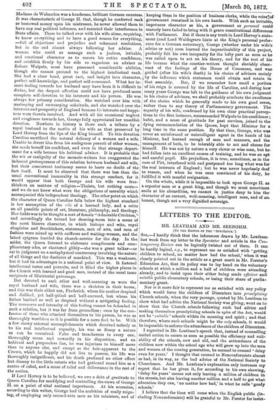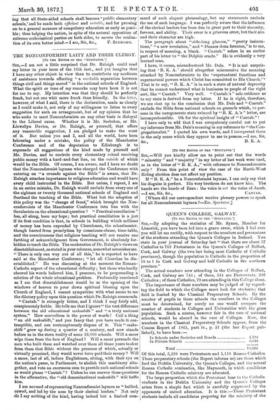LETTERS TO THE EDITOR.
MR. LEATHAM AND MR. SEEBOHM.
[TO THE ED/TOR OF THE "SPECTATOR.")
hardly think that the inferences drawn by Mr. Leathaim last week from my letter to the Spectator and article in the Con- temporary Review can be logically twisted out of them. It can be hardly logical, e.g., to represent me as satisfied with ' getting children to school, no matter how bad the school,' when it was clearly pointed out in the article as a great merit in Mr. Forster's. Education Act, that its policy was to lay hand on the voluntary schools at which a million and a half of children were attending already, and to insist upon their either being made efficient andt suitable public elementary schools, or losing their share of parlia- mentary grant.
Nor is it more fair to represent me as satisfied with any policy- which would force the children of Dissenters into proselytizing' Church schools, when the very passage, quoted by Mr. Leatham to. show what bad advice the National Society was giving, went on to. show that the Church schools following such bad advice and making themselves proselytizing schools in spite of the Act, would not be ' suitable ' schools within its meaning and spirit ; and that therefore, where such schools might be the only schools, it would be impossible to enforce the attendance of the children of Dissenters.
I regretted in Mr. Leatham's speech that, instead of counselling: united action to secure as soon as possible the efficiency and suit- ability of the schools, new and old, and the atttendance of the. children now within the school age who will grow up into the men and women of the coming generation, he seemed to counsel delay even for years.' I thought that counsel to Nonconformists almost. as bad, in its way, as the bad advice of the National Society to Churchmen. And Mr. Leatham's explanation only increases my regret that he has given it, for according to his own showing,. 'delay for years' means not only leaving a million of children in the streets, but also leaving another million and a half to get what education they can, 'no matter how bad,' in what he calls goody schools.'
I believe that the time will come when the English public (in- cluding Nonconformists) will be grateful to Mr. Forster for insist-.
in that all State-aided schools shall become 'public elementary schools,' and be made both efficient and suitable, and for pressing on to a general measure of compulsory education as early as possi- ble; thus helping the nation, in spite of the natural opposition of extreme ecclesiastical parties on both sides, to secure the realisa-
tion of its own better mind.— I am, Sir, &c., F. SEEBOHM.



































 Previous page
Previous page